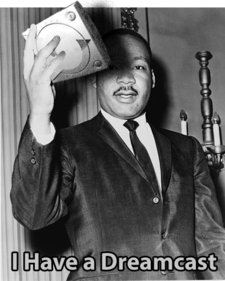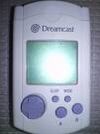Dreamcast
| Dreamcast | |
|---|---|
| Developer(s) | Sega |
| Publisher(s) | Raptor Jesus |
| Release date | 1999–2001 |
| Genre | Holy Relic |
| Platform(s) | Floating |
| Rating | Omnipotent |
The Dreamcast was the final video game console produced by Sega before the company had their hands tied. Despite only being manufactured for a brief two years, it remains popular to this day, and is considered the world's most holy game system due to the fact that it sacrificed itself for our sins.
History[edit]
The Dreamcast was initially created as prophecised by an ancient rite that involved sticking a katana into a shark, tying some belts around it, then throwing it into a whirlpool. The result was born unto the world in a giant conch shell (hence the symbol) and praised by the gods of gaming as the king of consoles.
The console was claimed to be able to give sight to the blind, raise the dead (as zombies), skim across water and provide nourishment to gamers playing feverishly in their virgin mom's basements. While it proved to be ineffective at most of these proclaimed miracles, the controller was useful for stoning heretics to death. It is believed that Martin Luther King found one whilst out in the wilderness and wrote his famous speech, sadly a coffee stain meant the 'cast' part was unreadable.
Back in Sega HQ in Japan, an underpaid sushi delivery boy finds the console under a pile of unsold SG-1000 games and it is hailed as the console that would make Sega profitable again, sadly he delivered a bad batch of sushi that day and the marketing department would need emergency stomachs pumping, their jobs being filled in by the cleaning ladies and the bloke that always looks like he's been smoking a few.
Hardware[edit]
- Controller – The most sensual and bizarre game controller ever. It has long been considered a mystery why the cable comes out of the base of the controller, but the leading theory is that it is to enable the playing of games while upside-down.
- Rumble pack – The Dreamcast rumble pack (known as a "Force Pack" to the Jedi community) is actually a re-engineered phaser stolen from the U.S.S Enterprise. While it is a seemingly harmless component, SEGA has issued statements citing a few "kinks" (Most likely referring to the device's tendency to fire ionized beams of particle energy at random, disintegrating anyone or anything in its path).
Memory card (VMU)- The Dreamcast memory card, or VMU for "Virtual Mind Usurper", is a mind-saving cerebral probe, cleverly disguised as an external memory unit. Once placed into a controller, the VMU will emit a soothing hum, lulling the convertee to sleep as the probe attaches itself to his or her brainstem. Since the discontinuation of the Dreamcast in 2001, the surviving VMU's have schismed and declared war against the church of the Purist Controllers.
Death[edit]
As soon as the gaming community figured out that any ISO image from a Dreamcast game could be burnt onto a 700MB CD-r, the low profit that Sega had been receiving instantly fell into the negatives. Every Dreamcast owner had stopped buying the legit games and only downloaded the bootlegs. (Except for the technologically retarded who still paid for the bootlegs). Even video game stores switched over to holding bootleg copies on the store shelves. It made buying a game for the Dreamcast extremely difficult as the box art was missing and every game title was poorly hand-written by a sharpy. Eventually lazy people would start abbreviating the game titles making it impossible to decipher. House of the Dead 2 became House 2, which then became H2. Sega soon realized that if they wanted to make any money at all they would have to burn images of their own games and re-distribute it to the public.
The production lines for the Dreamcast, not to mention most of the remaining stock, had to be used in the construction of a mausoleum for Sonic the Hedgehog, who had been struggling with illness since failing to make the leap to 3D. However the temple was set siege by the game cube and Sonic's corpse was brought to Princess Peach's castle and made to dance like a puppet on strings, churning out a string of lifeless performances in ashcan projects year after year to fulfill his contractual obligation to his new masters.
| ||||||||||||||||||||||||||



